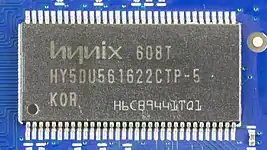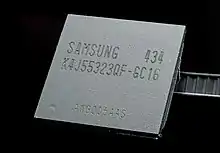GDDR SDRAM
Graphics DDR SDRAM (GDDR SDRAM) is a type of synchronous dynamic random-access memory (SDRAM) specifically designed for applications requiring high bandwidth,[1] e.g. graphics processing units (GPUs). GDDR SDRAM is distinct from the more widely known types of DDR SDRAM, such as DDR4 and DDR5, although they share some of the same features—including double data rate (DDR) data transfers. As of 2023, GDDR SDRAM has been succeeded by GDDR2, GDDR3, GDDR4, GDDR5, GDDR5X, GDDR6, GDDR6X and GDDR6W.
| Computer memory and data storage types |
|---|
| Volatile |
| Non-volatile |
Generations
 Hynix GDDR SDRAM
Hynix GDDR SDRAM A Samsung GDDR3 256MBit package
A Samsung GDDR3 256MBit package A 512 MBit Qimonda GDDR3 SDRAM package
A 512 MBit Qimonda GDDR3 SDRAM package Inside a Samsung GDDR3 256MBit package
Inside a Samsung GDDR3 256MBit package
DDR SGRAM
GDDR was initially known as DDR SGRAM (double data rate synchronous graphics RAM). It was commercially introduced as a 16 Mb memory chip by Samsung Electronics in 1998.[2]
GDDR2
GDDR3
GDDR4
GDDR5
GDDR6
GDDR7
Table of transfer rates
| Module type | Chip type | Memory clock | Transfers/s | Transfer rate | |
|---|---|---|---|---|---|
| ? | GDDR2 | 500 MHz | ? | 128 Gbit/s | 16.0 GB/s |
| 64 lanes | GDDR3 | 625 MHz | 2.5 GT/s | 159 Gbit/s | 19.9 GB/s |
| 64 lanes | GDDR4 | 275 MHz | 2.2 GT/s | 140.8 Gbit/s | 17.6 GB/s |
| 64 lanes | GDDR5[3] | 625–1125 MHz | 5–9 GT/s | 320–576 Gbit/s | 40–72 GB/s |
| 64 lanes | GDDR5X[4] | 625–875 MHz | 10–12 GT/s | 640–896 Gbit/s | 80–112 GB/s |
| 64 lanes | GDDR6 | 875–1125 MHz | 14–18 GT/s | 896–1152 Gbit/s | 112–144 GB/s |
| 64 lanes | GDDR6X | 594–656 MHz | 19–21 GT/s | 1216–1344 Gbit/s | 152–168 GB/s |
| ? | GDDR6W | ? | ?―22 GT/s | ? | ? |
| ? | GDDR7 | ? | ?―36 GT/s | ? | ? |
References
- "Graphics Double Data Rate 6 (GDDR6) SGRAM Standard". JEDEC: Global Standards for the Microelectronics Industry. JEDEC. Retrieved 15 March 2022.
- "Samsung Electronics Comes Out with Super-Fast 16M DDR SGRAMs". Samsung Electronics. Samsung. 17 September 1998. Retrieved 23 June 2019.
- "GRAPHICS DOUBLE DATA RATE (GDDR5) SGRAM STANDARD JESD212C". JEDEC. 2016-02-01. Retrieved 2016-08-10.
- "GRAPHICS DOUBLE DATA RATE (GDDR5X) SGRAM STANDARD JESD232". JEDEC. 2015-11-01. Retrieved 2016-08-10.
This article is issued from Wikipedia. The text is licensed under Creative Commons - Attribution - Sharealike. Additional terms may apply for the media files.